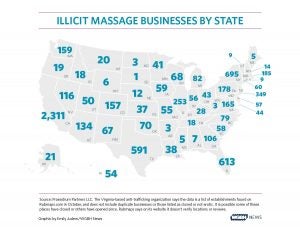The Polaris Project has been documenting the use of trafficked women from Asia in the illicit massage parlor business in the US. There are about 9,000 of these places operating in the US in rural areas, suburban strip malls and the inner cities. Their total profits annually are around 2.5 billion dollars. They are seldom investigated by police and operate with impunity, in part because many in the US see them as “harmless.” Yet the women who work in them, largely from Asian nations, especially China, were recruited falsely with the promise of jobs in restaurants, hotels, etc. When they arrive, traffickers take their passports, drive them to other parts of the country so that they do not know where they are, and then put them into massage parlors where they quickly learn they are expected to perform sex acts. The living conditions are horrible–many never leave these parlors, sleeping on the same massage tables where they are forced to have sex. They are told that if they leave or go to the police, they will be put in prison for being illegal. Even more shocking is that in a study of the clients, the Polaris project found the majority were white men, many of whom were well educated, and most of whom had been sex tourists in other countries. They often said in justification that “these things are looked at differently in other countries,” “It is not big deal over there,” “this is harmless–just a little fun.” But is it fun or harmless for the women enslaved in this trade? There are also web sites that rate these massage parlors and provide a guide to men traveling to different cities about where to find them. Police turn a blind eye–seeing these massage parlors as less serious than other crimes they have to deal with. If they do conduct a raid, they most often arrest the women for prostitution but not the clients using the services. Not surprisingly, these women, many of whom speak little English, are afraid to speak up. North Carolina is home to a large number of these operations, especially around our military bases. The question is: what can be done to stop these practices or are they indeed less serious than other types of trafficking?
–Holly Mathews

